
There seems to be some question over which English is the proper English. The British would have you base the resolution of this matter on historical precedence, but this is folly. In comparison to American English and the ingenuous Australian English, the Queen's is corrupted so there shouldn't be any real doubt. How offensive it is to the ear to hear the world "schedule" pronounced "schedule" as if the English had no idea that it should really be pronounced "skedule" as we do in the Colonies. I'm no linguist, but as we walked through the streets of London and ate at her restaurants, we heard the speech of the commoner, and it became clear that the (French) Norman invasion of Britain has left a legacy on the Queen's language. Why else would they corrupt the language with that annoying habit of dropping off consonants from the beginning and end of words (apparently they do the same with consonants in the middle of the words as in Leicester and Gloucester)? Perhaps the final resolution of this debate should rest in the hands of the world's citizens who clearly favor American English which dominates music, television, and even the internet.

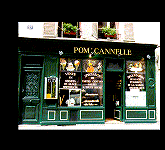
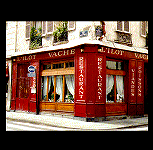
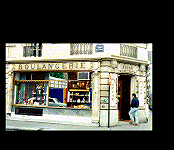
In the capital cities of three of the poorest members of the European Union you see similar scenes. In Madrid cigarettes are sold by individuals in the subway stations, and lottery tickets are sold by older women and blind people throughout the city. In Dublin, three women and a man at a street corner yell out "tobacco!" and "cigarettes!" In Athens, lottery vendors walk through the streets or stand next to collapsible stands of tickets calling out that they have lottery tickets for sale.

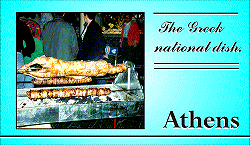
We walked through a meat market one day in Athens and saw numerous flayed, whole sheep hanging from their hind legs. There were also buckets of grayish-white intestines hanging out over the edges of large buckets as if to entice customers.
Karen looked out of her window as we were traveling through Greece on Easter Sunday, and realized that lamb was the Greek equivalent to American turkey. She saw the same scene over and over again: a family gathered in a backyard while a lamb was being roasted.

It rained sporadically while we were in Rome, and we noticed that whenever the rain started up Indian men could be seen selling umbrellas everywhere. Only two minutes before we hadn't noticed a one!

It was common to see North African street merchants with their goods folded up and under their arms or besides their legs as they looked anxiously down the street from a corner where they could easily conceal themselves. Karen had seen several of them folding up their tables and stands when they saw the police walking in their direction. We wondered if these merchants were discriminated against because there were numerous other street merchants, all apparently Italians, who seemed to have no worry of the police or Carabinieri. The only difference that we could discern was the obvious physical difference and the type of merchandise being sold. The anxious merchants sold such things as sunglasses, "cheap" posters, leather bags, and small handicrafts that didn't appear to be made locally. The Italian street merchants sold cheap watercolor pictures, postcards, and caricatures of tourists on demand. There were also news and magazine stalls or stands that sold guidebooks, pornographic magazines, and postcards. Unless is was merely a question of not having the proper visa, it appeared that the North Africans were being unfairly discriminated against.


The food in Europe was invariably much more expensive than America. The price of drinks at restaurants of any size was always much, much more than at grocery type stores where you could often find bottled drinks for a comparable price with that in the U.S. In Italy, we ate at trattorias and ristorantes when we were real hungry and didn't care how much we spent for a meal. We ate our cheapest large meals, as much as 50% less than at a sit-down restaurant, when we purchased food at deli type stores where we could usually find prepared food such as pollo arrosto (roasted chicken) cooked with a delicious blend of spices, riso (rice) salad, formaggi, even an inexpensive bottle of Chianti, and fresh pannini (bread). We'd have an impromtu picnic somewhere, though we were usually not willing to walk too far and often ate these meals on the first bench we could find. When we weren't so hungry, we would go to snack bars for a cappucino, pastries, and dry sandwiches which didn't consist of much more than a slice or two of meat in between two pieces of bread without any spread or other "fattening extras" like that found in America (which is one reason why you'll notice that Europeans are much thinner as a whole than Americans). We also ate at the pizzerias where pizzas come by the slice and are folded over to make a sandwich. The pizza we ate in Rome was far superior to that in Florence.
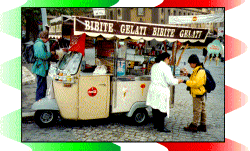
Napkins in Rome are more suited for absorbing the ink of a pen than they are for absorbing the oil from Italian food, and this in not a comment on Italian food.

We couldn't find non-carbonated bottled water in Vienna, but who cares? Edelweiss Beer is the best - sehr gut!
When in Wien (Vienna) we felt obliged to have a "wienner". I never actually saw anything called a "wienner", but this must be the origin of the hot-dog just as Italy is the origin of the pizza. Besides, hot-dogs and sausages sold from booths in Austria is the closest thing you can get to inexpensive food. Here is the art of making a hot-dog in Austria: first, the top of a baguette is lopped off, but this top is saved; then they push the baguette over a skewer with the cut piece down first; mustard and/or catsup is squirted into the hole that was just created; then the hot-dog or sausage is inserted with wooden tongs and it is handed to you after more mustard and/or catsup is added to the cutoff portion which forms a hat for your meal. Of course they taste infinitely better accompanied mit bier!

A few restaurants we ate at in Prague and the nearby city of Kolin had weights listed next to the main course items. The weights were usually within the 100-200 grams range. I couldn't help but wonder if this had something to do with the way life was under the CSSR (Czechoslovakian Soviet Socialist Republic).
We ate one of our favorite meals in Prague, a bowl of goulash at a corner bar we only chose because there weren't many restaurants open at the time. We had goulash in Vienna and Berlin too, but none were to compare with this.


Both in Vienna and throughout Germany, one of the more popular hot-dog/sausage stand items is currywurst. Its uniqueness is in the condiment not the bread or meat. What makes the currywurst is the curry powder mixed with catsup to heighten the flavor of the sandwich.

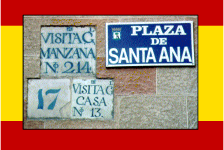
Having grown up in Southern California, I naively expected Spain to reflect much of what I had been exposed to of Hispanic culture but this was not to be the case. Some simplistic examples are found in the food. A tortilla in Spain is not the same tortilla found in the Americas. It is simply an omelet. The only time I saw refried beans was when we went to a Mexican restaurant. Rice is the principal ingredient of paella, and a similar flavored rice is also common in Mexican dishes though, but rice found in the Hispanicized Philippines and other places of East Asia is invariably steamed without additional flavors added.

Traveling through Europe, it became easy to make some over-generalizations about people. North Africans could often be seen selling useless tourist items at tourist sites and tourist oriented cities like Rome and Paris. Chinese, the quintessential restauranteurs of the world, have restaurants in every nook-and-cranny. We even saw a Chinese restaurant in a tiny town in Ireland. Filipinos may possibly be the world's foremost domestic helpers. Indian and Arabic men are the world's foremost vendors.

My initial impression of Greek people, particularly women, was that they were not the most beautiful people in the world. Upon reflection I realized that I may be mistaking poverty for nature. In my final analysis I've concluded that a Greek nose is unique and that the women of Greece have, on average, the largest breasts I've seen which certainly adds to the latter's beauty despite other deficits.

